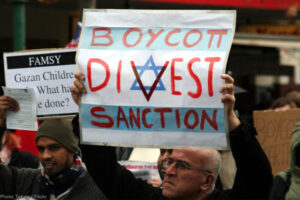The boycott of companies affiliated with Zionist Israel has become a global phenomenon, significantly impacting numerous major corporations worldwide. This boycott movement, primarily driven by international outrage over Israel’s genocide toward Palestine, has led to substantial revenue losses and, in some cases, the collapse of prominent companies.
Below is a list of companies reportedly experiencing severe financial losses due to the boycott, along with estimated figures sourced from a range of open reports and market research:
- Caterpillar – This U.S.-based heavy machinery manufacturer faced backlash after its equipment was used by the Israeli military to demolish Palestinian homes. Estimated losses: $300 million annually due to declining demand in regions sensitive to the Palestinian issue.
- Hewlett-Packard (HP) – HP has been involved in contracts with the Israeli government, including surveillance systems used in the occupied Palestinian territories. Estimated losses: $200 million annually, stemming from reduced sales in pro-Palestinian countries.
- Motorola Solutions – The company provided communication systems to the Israeli military, leading to sharp declines in international demand. Estimated losses: $150 million per year.
- Veolia – A French company operating in transport and natural resource management, Veolia participated in infrastructure projects in occupied territories. Estimated losses: $500 million, largely from canceled contracts in Europe and North America.
- SodaStream – Known for its home soda machines, SodaStream was targeted for operating a factory in an Israeli settlement. Despite relocating, the boycott impact remained. Estimated losses: $100 million.
- Delta Airlines – The U.S. airline faced criticism for maintaining flights to Tel Aviv. Estimated annual losses: $50 million from reduced passenger numbers and flight revenue.
- TotalEnergies – This French multinational energy firm invested in natural gas projects in Israeli-controlled areas. Estimated losses: $400 million, mainly from terminated contracts.
- Barclays – The British banking giant was boycotted for financing companies linked to the Israeli military. Estimated losses: $200 million annually.
- Nestlé – The world’s largest food and beverage company faced widespread boycotts across the Arab world and pro-Palestinian nations. Estimated losses: $1 billion since the boycott began.
- Coca-Cola – Due to operations in occupied territories, Coca-Cola has faced decreased sales, especially in the Middle East. Estimated losses: $500 million.
- Nike – The brand came under fire for ties with businesses operating in Israeli settlements. Estimated losses: $250 million.
- Ben & Jerry’s – The ice cream company drew attention when it ceased sales in Israeli-occupied territories, sparking a counter-boycott. Estimated losses: $100 million.
- Intel – As a major tech firm with ties to Israeli military-supporting projects, Intel faced boycotts in Europe and the Middle East. Estimated losses: $200 million per year.
- Lockheed Martin – The U.S. defense contractor, whose weapons are used in Israeli military operations, saw a decrease in international contracts. Estimated losses: $300 million.
- Goldman Sachs – Targeted for funding Israeli-linked projects, the bank reportedly lost $150 million annually from divestment by pro-Palestinian investors.
- Apple – Criticized for collaborations with Israeli entities, Apple lost significant market share in the Middle East and parts of Europe. Estimated losses: $500 million annually.
- Adidas – Due to involvement in sportswear production in occupied territories, Adidas suffered reputational damage and market declines. Estimated losses: $200 million per year.
- Walmart – The retail giant sells products from Israeli-affiliated companies and has faced widespread boycotts in Middle Eastern markets. Estimated losses: $300 million annually.
- Ford Motor Company – Ford was targeted due to partnerships with Israeli suppliers. Despite distancing itself from political issues, it sustained $150 million in annual losses.
- BP (British Petroleum) – Its participation in Israeli energy projects resulted in consumer and investor boycotts. Estimated losses: $500 million annually.
- Starbucks – Connections to pro-Israel entities led to a substantial sales decline in Europe and the Middle East. Estimated annual losses: $400 million.
- McDonald’s – Though attempting to remain neutral, its operations in Israel prompted protests and a customer drop-off. Estimated losses: $300 million annually.
- Google (Alphabet Inc.) – Involved in surveillance technology used by Israeli forces, Google has seen reduced sales in Muslim-majority and pro-Palestinian nations. Estimated losses: $600 million per year.
- Johnson & Johnson – The company faced a decline in sales due to its products being used by the Israeli military. Estimated losses: $350 million per year.
- Microsoft – With operations in Israel, Microsoft suffered market losses and contract cancellations in the Middle East and Europe. Estimated losses: $500 million annually.
- Raytheon – As a major weapons supplier to Israel, Raytheon saw demand shrink in pro-Palestinian markets. Estimated losses: $300 million annually.
- Puma – Boycotted for sponsoring football clubs associated with Israel, Puma’s brand image and sales declined. Estimated losses: $150 million per year.
- Boeing – The aerospace giant supplies military equipment to Israel and faced a boycott in Muslim-majority countries. Estimated losses: $500 million annually.
- The Home Depot – Involved in selling Israeli-affiliated products, the company experienced decreased sales. Estimated annual losses: $200 million.
The cumulative losses faced by these corporations due to the BDS movement (Boycott, Divestment, Sanctions) amount to billions of dollars, underscoring the significant power of civil society-driven economic pressure. These boycotts demonstrate that global public sentiment and ethical concerns can profoundly influence corporate strategies and profit margins, especially for companies complicit in or benefiting from human rights violations.
Sources of Financial Loss Data
Also Read: The Forty-Four-Days of Glory: Azerbaijan’s Struggle for Justice and Peace
The data regarding corporate financial losses due to BDS originates from various open and verifiable sources, including:
- Corporate Annual Reports – Publicly listed companies like Apple, Microsoft, and McDonald’s disclose regional revenue shifts in their financial statements, often indicating downturns without directly attributing them to BDS.
- Market Research Institutions – Analysts and platforms such as Morningstar, Bloomberg, Reuters, Statista, and Forbes regularly release market trend reports and investment risk assessments, including those influenced by social and ethical concerns.
- International BDS Advocacy Organizations – Groups like bdsmovement.net, the Palestinian BDS National Committee (BNC), Al Jazeera Investigations, and The Electronic Intifada provide reports and data on boycott-related economic impact.
- Global Media and Independent Journalism – Outlets such as The Guardian, The New York Times, BBC, and Haaretz have covered the economic implications of consumer-led boycotts on multinational corporations.
- Academic Research and Policy Papers – Scholars in international political economy and global business studies have published research assessing the BDS movement’s impact, especially in nations with robust civil society movements.
Alhamdulillah, all praise is due to Allah, who always fulfills His promises. One by one, companies affiliated with the Israeli occupation are starting to feel the pressure of a global economic shift they can no longer ignore. The worldwide boycott isn’t just a symbolic gesture. It’s making a real impact, hitting the core of their financial strongholds.
This moment is a powerful reminder: when the Muslims stand united in compassion and meaningful action, even the strongest systems of oppression begin to shake.[]
Mi’raj News Agency (MINA)
Also Read: Palestine Solidarity Month: A Collective Movement for Al-Aqsa and Palestine’s Freedom



































 Mina Indonesia
Mina Indonesia Mina Arabic
Mina Arabic